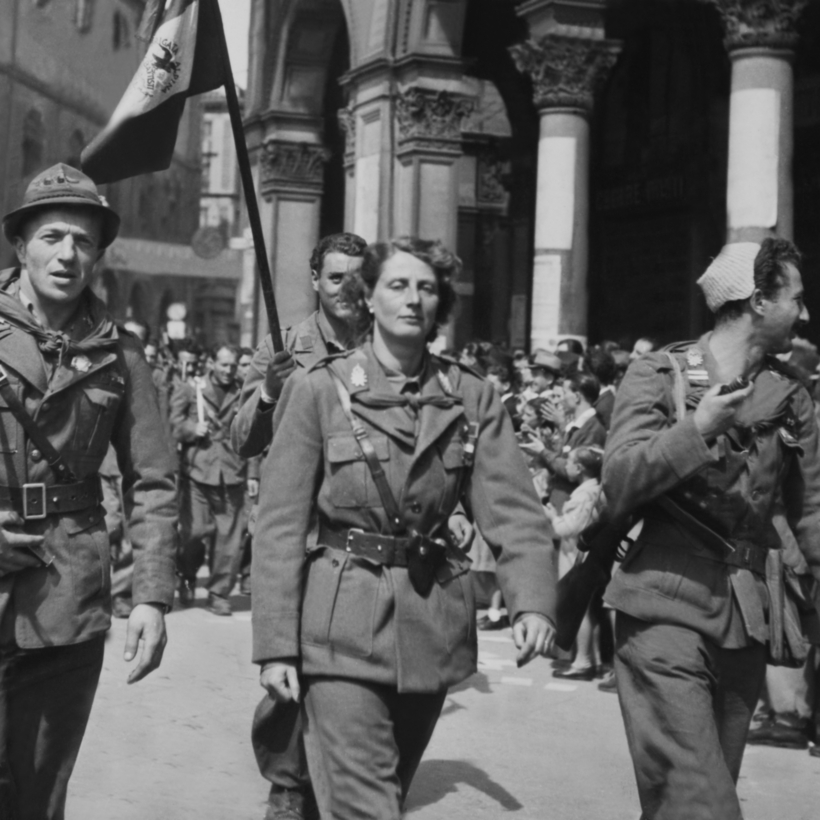In 1918, when Ada Prospero was just 15 years old, she fell in love with her neighbor in Turin, Piero Gobetti. A year older than she, he was tall, with dark curly hair, dazzling and intense, his smile enchanting. She was studying music and he was about to begin a law degree. They decided to learn Russian together (Ada was already fluent in English and French) and to read the same book whenever they were apart. Influenced by Benedetto Croce and Antonio Gramsci, Piero and Ada soon became active campaigners for political renewal. Through the publications Energie Nuove (New Energies) and Rivoluzione Liberale (Liberal Revolution), founded by Piero and edited by Ada, the couple became vocal critics of Benito Mussolini’s Fascist Party following its entrance into the government in 1922. Soon Mussolini’s Blackshirts were attacking Piero, repeatedly beating him to a pulp.
Ada and Piero were married in 1923. They had a son, Paolo. Their circle of friends included Natalia and Leone Ginzburg, Vittorio and Lisetta Foa, Primo Levi, and Levi’s sister, Anna Maria. By 1926, the Fascist beatings were taking a grave physical toll on Piero. He left Turin for Paris, Ada and Paolo to follow shortly. Piero died before they reached him. “For me, this love is not something in my life,” Ada had once written to her beloved. “It is my life, the air I breathe, the reason why I breathe.”
Feminists Against Fascism
In her gripping and important new book, A House in the Mountains, Caroline Moorehead describes how, following the death of her husband, Ada channeled her grief and honored her great love by taking action, co-founding the Partito d’Azione (Action Party) and becoming one of the leading organizers of the Italian resistance. She also co-founded Gruppi di Difesa Della Donna e per l’Assistenza ai Combattenti Della Libertà (Groups for the Protection of Women and Assistance to Fighters for Freedom), a collective of women united in the struggle for women’s rights and for the freeing of their country from Fascist rule. The group published and disseminated the feminist newspapers Noi Donne (We Women) and La Nuova Realtà (The New Reality), informing women about voting, working conditions in factories, education, and anything that contributed to Italian women gaining “the right to be full members of society.”

Moorehead’s account focuses primarily on the last two years of World War II, which in Italy were terrifically complicated. Mussolini was deposed in July of 1943 and replaced by Marshal Pietro Badoglio, who signed an armistice with the Allies. But by September, with the help of Hitler, Mussolini had established the Italian Social Republic at Salò. In the meantime, the Allies were slowly working their way up from Sicily to Rome fighting the Germans and Fascists. Also in September, six of the various Italian resistance movements came together and formed their own government in Rome called the Committee of National Liberation.
Ada Prospero honored her great love by taking action, becoming one of the leading organizers of the Italian resistance.
Against this knotty political backdrop, Moorehead delicately unravels and interweaves the personal stories of several key women in the Italian resistance, while also recounting the significant contributions and heroic feats of a great swath of Italian girls and women known as staffette. Moorehead explains: “Staffette carried messages, transported weapons, nursed, acted as lookouts, became political commissars, arranged escape routes, stole explosives, and occasionally became commanders of bands.... They collected the bodies of executed partisans and washed them, and noted the names of those thrown into unmarked graves by the Fascists so that they could later show their families.... They learned to shoot, most preferring revolvers to machine guns.... There were housewives, peasants, teachers, university professors, secretaries, Jews, Catholics and non-believers.”

For 20 years under Fascism, girls had been brought up to feel inferior, to see themselves primarily as breeders. The women of the resistance were hopeful that liberating Italy from Mussolini’s grasp would also mean liberating women from patriarchal oppression. Tens of thousands of Italian women risked or suffered arrest, torture, rape, persecution, and execution in the fight to free Italy from Fascism and the German occupiers.
“No One at All Remembers Us”
Italy’s women were essential to Fascism’s ultimate downfall, but their postwar political power would prove negligible (despite gaining the right to vote in February of 1945). “All the old prejudices, enshrined in twenty years of Fascist rule, resurfaced,” writes Moorehead. “Women were again viewed as intrinsically weak and politically ignorant.” Recognition of their role in the resistance would be written out of history and all but forgotten. In 1947, a former staffetta wrote to Noi Donne: “No one at all remembers us.”
“All the old prejudices, enshrined in twenty years of Fascist rule, resurfaced.”
Moorehead’s A House in the Mountains beautifully redresses this wrong, giving us a compelling narrative that vividly describes who these women were and what they did for their country. This volume concludes the author’s quartet on W.W. II resistance movements, comprising the books A Train in Winter: An Extraordinary Story of Women, Friendship, and Resistance in Occupied France; Village of Secrets: Defying the Nazis in Vichy France; and A Bold and Dangerous Family: The Remarkable Story of an Italian Mother, Her Two Sons, and Their Fight Against Fascism. Moorehead’s final book in the series, set in the mountains of Northern Italy, complements other great works that touched upon the same time and place: Natalia Ginzburg’s Family Lexicon, Ada Gobetti’s own Partisan Diary: A Woman’s Life in the Italian Resistance, Alexander Stille’s Benevolence and Betrayal: Five Italian Jewish Families Under Fascism, and Primo Levi’s If This Is a Man and The Truce.
“I hate neutrality in all its forms,” Ada wrote. “I think you have to believe in something and then fight for it, not impersonally but with the greatest passion.” A House in the Mountains is something of a manifesto against neutrality, and a showcase of the boundless power of female passion. The women of the resistance still have much to teach us today, and we elide them at our peril.
Jenny McPhee is a writer, translator, and director of the Center for Applied Liberal Arts at N.Y.U.’s School of Professional Studies


